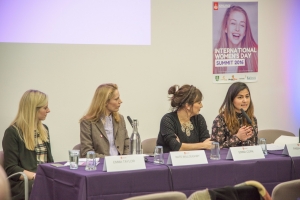by Rabia Nasimi
Author’s note: Following a meeting with BBC presenter Sana Safi, I was inspired to write about the importance of blogging, the scope of social media, and how it can help you build your network.
There are many reasons why you should blog. Not only does it improve your writing, it builds your confidence; helps you speak more coherently; builds you an audience; helps you stand out and builds your network. You may even get published. When I started my Masters at the LSE, and found out about the blogging opportunity on LSE Researching Sociology, I thought it would be a good way to voice my opinion and also help me to articulate my ideas more clearly.
Once you’ve written your blog, you need an audience. That’s when social media comes in handy. If you get a good number of people reading your blog, chances are someone will be interested and that’s where the networking aspect materialises. People you wouldn’t otherwise know will start to gain an awareness of your interests and what you do. You will start to create an image of yourself and people may get in contact with you to learn more about you. Networking is very handy and there is no right time; the earlier the better. It is about making connections and building enduring, mutually beneficial relationships. After all, we all know relationships are the catalyst for success.
So, shortly after my first blog, a friend of mine persuaded me to open a Twitter account as it is a good platform to reach a large audience whilst fostering communication on a global scale. It takes only a matter of minutes to open an account, so I thought, ‘Why not give it a try and see how it all goes?’
Source: Author's own photo
As with any social networking site, things start off quite slowly but with a good photo and a clear biography, you are bound to have people interested in following you in a matter of days. When I opened my account, I was lucky that my full name (@rabianasimi) was not taken, probably as it isn’t a very common name. The next thing I did was pick a picture and write a biography in 160 characters to describe myself and why my Twitter profile is worth following, which was quite challenging. I came up with this: “Interest in #Afghanistan, #Identity Formation and #Nationalism. MSc Student | Department of Sociology (Research) | #LSE”. It does take a few tries before you nail it, but that’s okay: with every change, you will get closer to perfection.
It was only a matter of days before I had LSE alumni followers, a UN Political Officer, journalists, Labour party activists, UN Afghanistan, a documentary filmmaker, Tolo TV Host, a PhD Student, a CEO of an organisation, Afghan politicians and a BBC World Service journalist. This was something that was beyond my expectation, I didn’t think my tweets would grasp such attention. Don’t forget the importance of #hashtags as it allows you to expose your content to a wider audience.
Following my latest blog, Women’s Rights in Afghanistan reaches stagnation. Could western notions of rights be the reason?, BBC Presenter, Sana Safi, tweeted: “@RabiaNasimi: you make an excellent point Rabia. Would love to meet up sometime”. When I had opened the account, I didn’t envisage such high profile individuals following me, let alone wanting to meet me to discuss my interests and how they can be developed further. On the 3rd March, I went to meet Sana Safi: we spent nearly two hours discussing current affairs in Afghanistan, the issue of gender and ethnic identity and the key role the diaspora can play in shaping the future of Afghanistan. In a matter of weeks, I became acquainted with Sana Safi, through Twitter, and now we were sitting face to face discussing issues in which we had a shared interest. Whether this would have happened had I not opened a Twitter account remains unknown but it is fair to say social media has the potential to bridge gaps between people of different backgrounds.
Through social media networking, the World Youth Organisation invited me to join a panel at their International Women’s Day 2016 Summit. So the benefits of blogging and using social media – in this case, Twitter – as a platform to share my posts were beginning to unfold.
I hope this piece has shone a positive light onto blogging. What you write doesn’t have to be perfect; you will improve with time. The points to consider when writing are to have a point; organise your thoughts well; add images to help enhance your content; and, most importantly, have something unique to say with a thematic perspective.





Really cool! Congrats